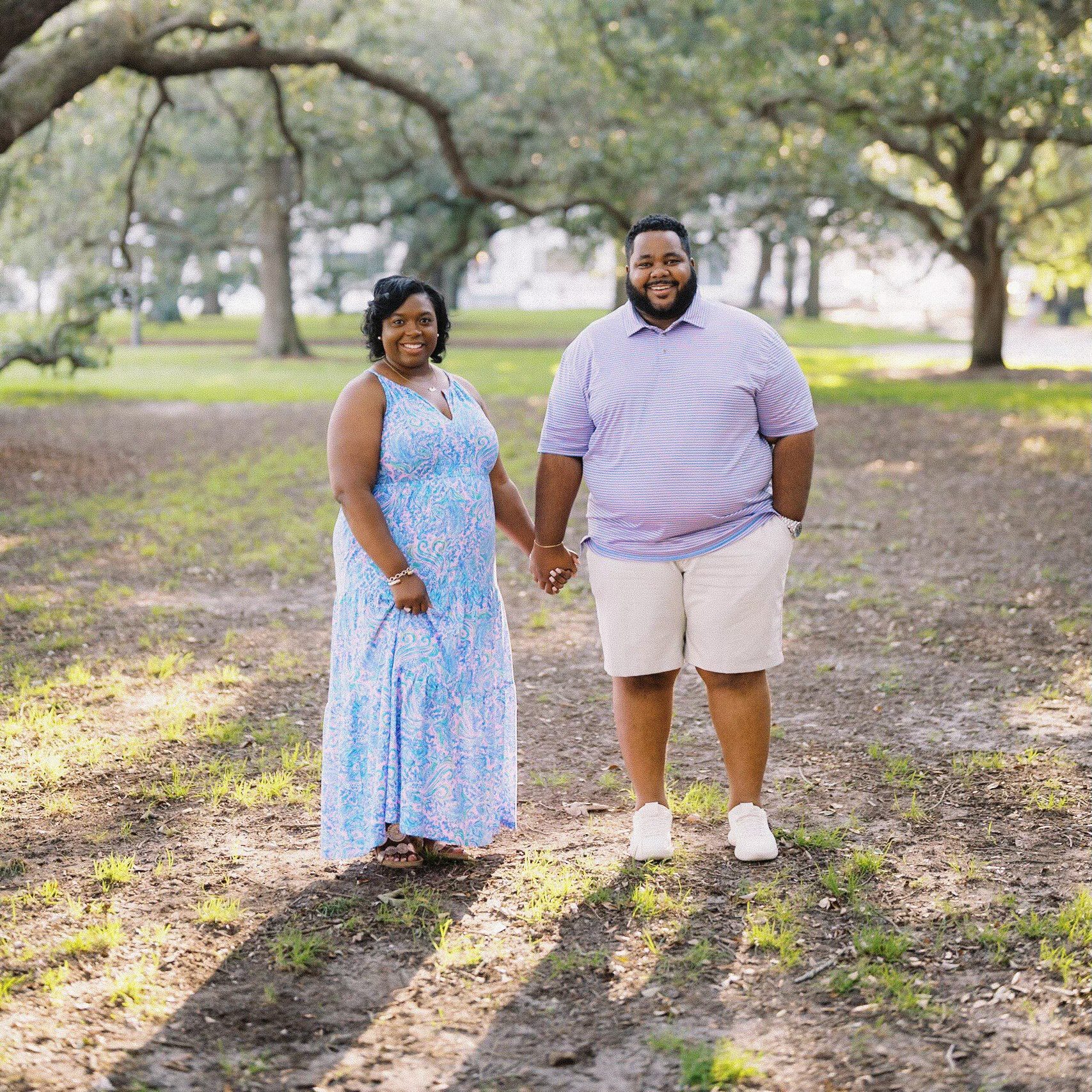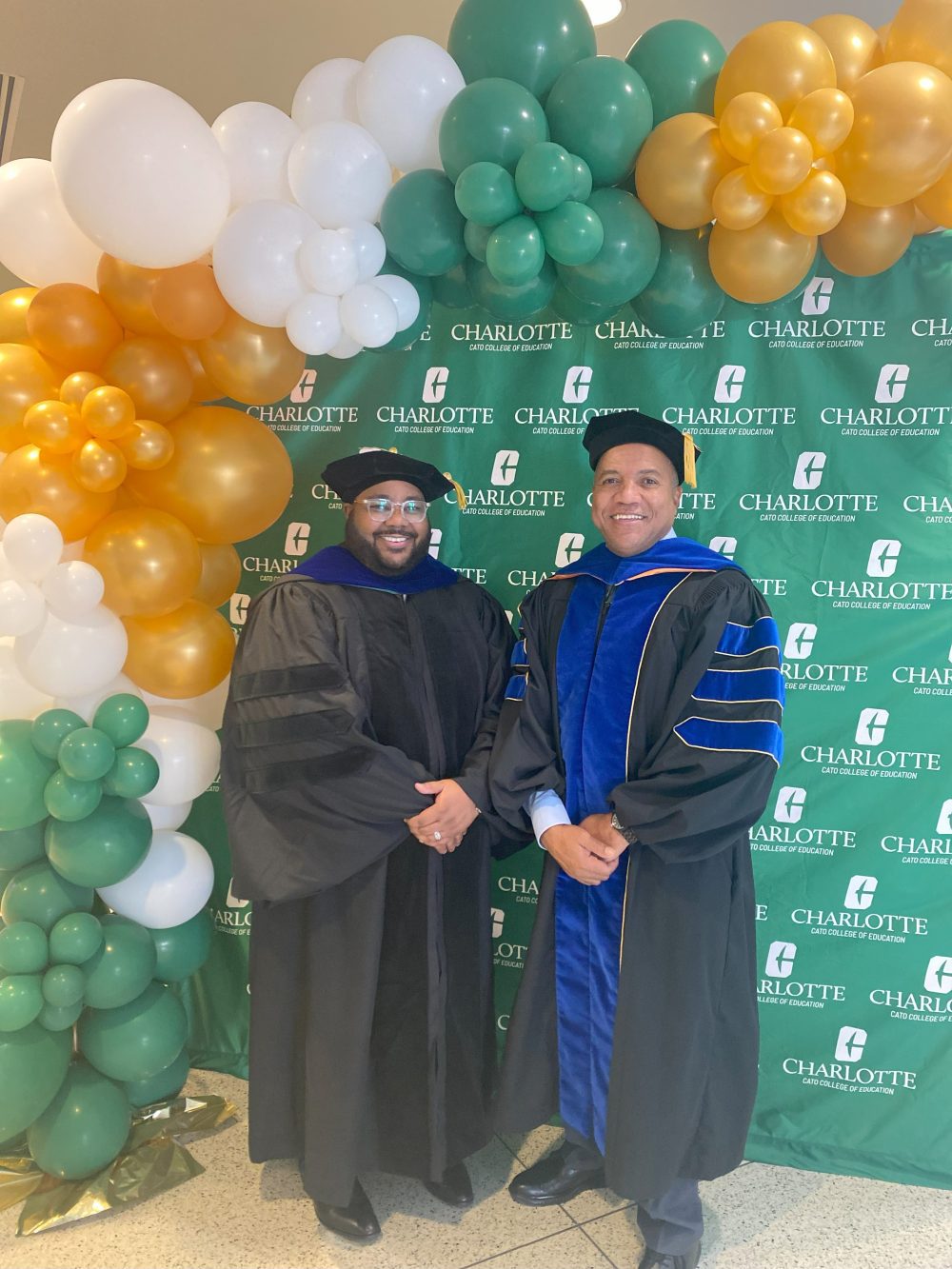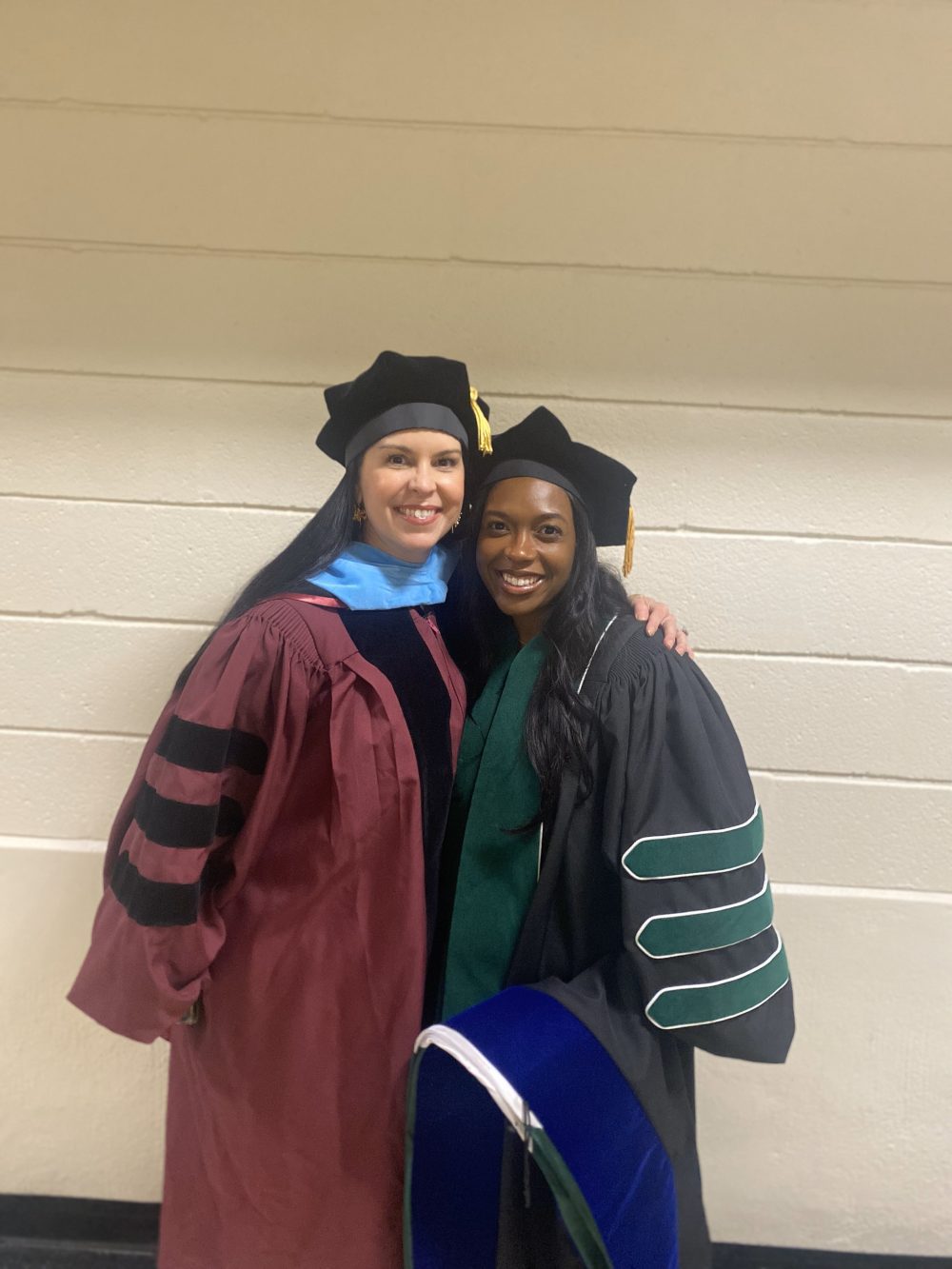‘Somebody Is Waiting for You’: Drs. Brittany ‘25 and Jaalil ‘24 Hart

There are two kinds of academics in this world – those who prefer outside encouragement and those who need support from those in the trenches with them.
Brittany and Jaalil Hart took the latter to what some may call the extreme in choosing to complete their doctoral degrees at the same time as husband and wife, but spending just a few moments with them, it’s immediately apparent that it’s become the most meaningful stage of their relationship.
Like ships passing in the night, the Harts both received their undergraduate degrees in education from NC A&T University on the same day but never met. It wasn’t until a Tinder match brought them together two years later once they were in the working world – Jaalil as a kindergarten teacher, Brittany as a learning specialist supporting literacy and children with learning disabilities – that their relationship began to blossom into the bond it is today.
Together or Not at All
After completing their Masters’ programs, Brittany at NC State and Jaalil at Illinois, they began to search for that next step. As a fourth- or fifth-generation educator, Jaalil knew he wanted to get his Ph.D. from day one, but Brittany wasn’t as convinced. “He had to kind of drag me,” she admitted, though he claimed, “It didn’t take much convincing!”
They decided to take on the crucible together and searched for an institution that had something for both of them, and after being accepted to a few programs, Charlotte quickly rose to the top. “There was a lot of really great work happening in Cato, and a lot of folks who had research interests that aligned with what I was interested in,” Brittany said. “It was also the combination of learning more about urban education, the history of education in this country, and how those historical pieces led us to where we are now – I think that’s particularly unique to this program because it is so important for us to understand why the issues we’re facing in education right now exist, and Charlotte did a really great job of giving us that piece.”
The faculty were also a big draw. “The opportunity to work with Cato faculty who are not just leaders in the fields, but great scholars and teachers, who are willing to support you as you grow in your work as a scholar and practitioner has been a really great opportunity for both of us. It’s given us an opportunity to see and do things beyond what we ever thought we’d be able to do.” They both went on to name mentors, advisors, and members of their dissertation committees that positively affected them – Erin Washburn, Bettie Butler, Alicia Stewart – but one in particular kept coming up as they spoke about their experience.
A Pivotal Moment
“One of our first classes in this program was with Dr. Chance Lewis. It was on Zoom, it was fall 2020 in the height of COVID-19, and he asked us to get up from our seats and go look out the window, and he said, ‘Somebody is waiting for you to finish this. Somebody is waiting. For you.’”
Brittany said it was the best advice she could have heard starting out in the program, but both she and Jaalil also clocked it as an inflection point in how they approached education. Anecdotes began flowing out of how their personal relationships with students have lasted well past their time as teachers – one former student was even the flower girl in their wedding! “We have so many kids that are in ninth or tenth grade now that we taught when they were five years old, and they are still very much our babies. So that idea of ‘somebody’s waiting for you’ – you have the power to make a difference in someone’s life.”
That was the first day of their first class as doctoral students, and it has stuck with them through the last five years and will for a long time to come. “I don’t think I ever told him that,” Jaalil admitted, “But that moment was pivotal for me. It set the tone for how I approached my classes, my work, theories from all these people I’d never heard of – none of that mattered because someone was waiting on me to finish. I had an obligation to finish. And now that I’m finished, because I’m finished, I’m able to do the work that I’m doing.”
Now that they’ve both successfully defended their dissertations, the Harts are involved at high levels changing the education systems for the better. Jaalil works for The Hunt Institute, an educational policy think tank in D.C., as the Director of K-12 Education Policy – a continuation of his research surrounding family engagement in their students’ education. Brittany is hard at work as an educational consultant, traveling the country evaluating Educator Preparation Programs (like UNC Charlotte itself) and how well they prepare candidates to enter the classroom as teachers. This is also a broader continuation of her area of research in teacher development, as she did her dissertation on teacher agency in professional development courses required of them, but also allows her to use the qualitative research and analysis skills she flexed throughout her process. At her hooding ceremony, she became Cato College’s first recipient of the Post-Master’s Certificate in Qualitative Research!


Worth the Sacrifice
When asked about their advice for anyone considering a doctorate or their program specifically, they both had some sage words of advice, but Jaalil couldn’t help but lead with – “Do it.”
“There are lots of people who will tell you not to do it, because it’s hard, it takes a long time, it might be expensive, you might have to sacrifice all these things – and while all of that is true, the reward is so much greater than all the sacrifice you have to make.” Sacrifice became a theme as they continued to share, recounting family reunions, birthdays, even funerals they missed because they were working on their research. They uprooted their entire lives to move from Raleigh to Charlotte in the thick of the pandemic, had to get new jobs that they both didn’t like, and hunted for new ones while working on their coursework.
“Just do it, because the opportunities that you get – not just from any Ph.D. program, because there are dozens and thousands of them out there – but the experiences and opportunities from the Ph.D. program at Charlotte? Every complaint that I had before when I was in class – gone. I understand now because I’m done, I’m on the other side. Just do it.”
In all the talk about sacrifice, the Harts recognize that their hard work has paid off in more than just academic or career dividends. “We have met some of the best friends of our lives in our program, because we are like-minded – even though we work very differently, we balance each other in those ways,” Jaalil said, and Brittany agreed, interjecting – “You cannot do it alone. You’ve got to have your people.”
Finding Their People
Brittany credits much of her success to her people, given her own struggles with feeling like she belonged. “As a first-gen college student, I very much felt like an imposter, and like I shouldn’t be here, but I have been so blessed to have folks in my corner who not just cheered me on, but also pushed me and put me in rooms, provided opportunities and spaces for me to prove to myself that I belong.”
She felt herself struggling in the later stages of her dissertation, but with every revision, her committee chair Erin Washburn would return her comments with encouragement attached. When Brittany hesitated to send it back for another round of edits, Washburn told her, “Perfection is sterile, but grace is fertile ground.” As a recovering perfectionist and feeling the burden of having to do right by all the blessings that had been given to her, it was exactly what Brittany needed to hear. “It made me realize everything doesn’t have to be perfect, I just need to put my best foot forward and that’s truly what everyone else is doing. Remembering that things don’t have to be perfect for me to move forward was a really pivotal point in my journey.”
They also both had folks advise them to slow down and take it step by step. Jaalil’s dissertation committee chair, Bettie Butler, had a moment with him when he was getting tired and trying to rush through the final stages of his work. “She literally told me, ‘No.’” When he was able to slow down and enjoy the process, things began moving a lot more smoothly.
Brittany, too, wanted to be done with things. “I’m the kind of person that wants to start a task and complete a task. But I had a friend, once I started writing, who said, ‘Just write a couple of sentences a day. Just chunk it.’ That really was a moment that helped me get it all written – and it wasn’t perfect, but I was okay with turning it in to my chair and methodologist and saying, ‘This is what I have right now, I’m ready for your feedback and to attack it again when you’re done.’ There is no timeline, do it on your terms and your time.”
…Together or Not At All
Today, they both say there’s no way they could have done it without the other. “We would have finished, but we would’ve hit the seven-year limit!” Jaalil joked.
Brittany continued, “We’re two different people, and we approached all of this in different ways, but I really don’t know how we could have done it alone. He just held me up so many days in so many little moments, all the way up to now being done. Even just the little reminders – ‘Hey, you need to open up that document,’ ‘hey, you need to read this article,’ ‘have you emailed this person back or submitted that conference proposal?’” –
“To which the answer was almost always no!” Jaalil cut in. “But then we pushed each other to do it. It’s one thing to do this by yourself and not have anyone outside of your program to vent to. But then to have her to turn to and say ‘I don’t know how the hell I’m going to write this lit review, I don’t even know where to start!’ and her be in the same experience and know just as much as I do, we were able to figure it out together.”
It wasn’t without its stressors. “I think most days were 16-17 hour days for us,” Brittany said. “Between getting up, going to work full-time, coming home, going to class, and doing the work – we didn’t sleep! But we had each other. We were tired, but we were tired together.”